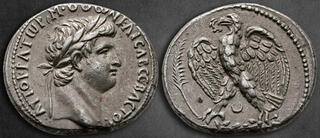| Savoca Numismatik GmbH & Co. KG > Online Auction 198 | Silver | Auction date: 25 February 2024 |
| Lot number: 185 Price realized: 1,500 EUR (Approx. 1,622 USD) Note: Prices do not include buyer's fees. | Show similar lots on CoinArchives Find similar lots in upcoming auctions on |
| Lot description: Seleucis and Pieria. Antioch. Otho circa AD 69-69. Tetradrachm AR 28 mm, 15,03 g ΑΥΤΟΚΡΑΤⲰΡ M OΘⲰN KAICAP CЄΒΑCΤΟC, laureate head of Otho to right / [ЄΤΟΥC A], eagle with spread wings standing left on wreath, holding wreath in beak; between eagle's legs, crescent; in field to left, palm frond. Nicely toned and with a wonderful portrait of fine style. Extremely Fine. McAlee 316; Prieur 101; RPC I 4199. Otho's brief reign as Roman Emperor, spanning from January 15 to April 16, 69 AD, is a pivotal yet tragic episode in the turbulent Year of the Four Emperors. Born Marcus Salvius Otho, he initially rose to prominence as a friend and later an adversary of Emperor Nero, before seizing the throne in a coup that led to the suicide of his predecessor, Galba. Otho's ascension to power was marked by ambition and the desire for reform, but his rule was immediately challenged by Vitellius, the commander of the German legions, who also claimed the imperial title. The political landscape of Rome at the time was fraught with instability, characterized by rapid shifts in power, betrayals, and widespread dissatisfaction among the military and the Senate. Otho sought to consolidate his rule and gain the loyalty of the Praetorian Guard and the legions, but the allegiance of Rome's military forces was deeply divided. The decisive conflict of Otho's reign was the Battle of Bedriacum (or Betriacum), fought in northern Italy near Cremona. This confrontation between the forces loyal to Otho and those of Vitellius ended in a defeat for Otho's army. In the aftermath of this battle, Otho made a remarkable decision that underscored his character and his concern for the Roman state. Rather than prolonging the civil war and the suffering it would entail, Otho chose to commit suicide, hoping his death would pave the way for peace and spare Rome further bloodshed. Otho's death brought an end to his short-lived reign, but it also demonstrated a rare act of self-sacrifice in the pursuit of a greater good for Rome. His decision to avoid further conflict was a poignant moment in an era marked by ambition and ruthless power struggles. Otho's reign, though brief, highlighted the complexities and challenges of imperial leadership during one of the most tumultuous periods in Roman history. His legacy, defined by his final act of sacrifice, left an indelible mark on the annals of the Roman Empire, reminding future generations of the heavy costs of civil war and the personal dilemmas faced by those who wielded supreme power Starting price: 1200 EUR |  |


